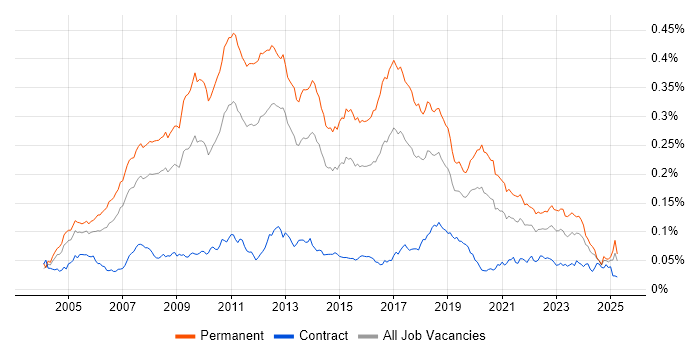Lead .NET Developer
UK > England
The median Lead .NET Developer salary in England is £70,000 per year, according to job vacancies posted during the 6 months leading to 5 May 2025.
The table below provides salary benchmarking and summary statistics, comparing them to the same period in the previous two years.
| 6 months to 5 May 2025 |
Same period 2024 | Same period 2023 | |
|---|---|---|---|
| Rank | 628 | 738 | 810 |
| Rank change year-on-year | +110 | +72 | +142 |
| Permanent jobs requiring a Lead .NET Developer | 30 | 106 | 138 |
| As % of all permanent jobs advertised in England | 0.064% | 0.12% | 0.15% |
| As % of the Job Titles category | 0.071% | 0.13% | 0.16% |
| Number of salaries quoted | 29 | 98 | 134 |
| 10th Percentile | £56,000 | £60,000 | £52,500 |
| 25th Percentile | £65,000 | £65,000 | £62,500 |
| Median annual salary (50th Percentile) | £70,000 | £75,000 | £72,000 |
| Median % change year-on-year | -6.67% | +4.17% | +10.77% |
| 75th Percentile | £80,000 | £92,750 | £87,500 |
| 90th Percentile | £104,000 | £133,625 | £95,000 |
| UK median annual salary | £70,000 | £75,000 | £72,250 |
| % change year-on-year | -6.67% | +3.81% | +11.15% |
All Permanent IT Job Vacancies
England
For comparison with the information above, the following table provides summary statistics for all permanent IT job vacancies in England. Most job vacancies include a discernible job title that can be normalized. As such, the figures in the second row provide an indication of the number of permanent jobs in our overall sample.
| Permanent vacancies in England with a recognized job title | 42,114 | 80,514 | 84,327 |
| % of permanent jobs with a recognized job title | 90.37% | 94.48% | 91.53% |
| Number of salaries quoted | 24,536 | 60,209 | 53,453 |
| 10th Percentile | £30,000 | £28,500 | £32,500 |
| 25th Percentile | £42,464 | £38,125 | £45,000 |
| Median annual salary (50th Percentile) | £57,500 | £53,500 | £60,800 |
| Median % change year-on-year | +7.48% | -12.01% | +1.33% |
| 75th Percentile | £75,000 | £71,915 | £82,500 |
| 90th Percentile | £97,500 | £90,822 | £100,000 |
| UK median annual salary | £57,500 | £52,500 | £60,000 |
| % change year-on-year | +9.52% | -12.50% | - |
Lead .NET Developer
Job Vacancy Trend in England
Job postings that featured Lead .NET Developer in the job title as a proportion of all IT jobs advertised in England.

Lead .NET Developer
Salary Trend in England
3-month moving average salary quoted in jobs citing Lead .NET Developer in England.
Lead .NET Developer
Salary Histogram in England
Salary distribution for jobs citing Lead .NET Developer in England over the 6 months to 5 May 2025.
Lead .NET Developer
Job Locations in England
The table below looks at the demand and provides a guide to the median salaries quoted in IT jobs citing Lead .NET Developer within the England region over the 6 months to 5 May 2025. The 'Rank Change' column provides an indication of the change in demand within each location based on the same 6 month period last year.
| Location | Rank Change on Same Period Last Year |
Matching Permanent IT Job Ads |
Median Salary Past 6 Months |
Median Salary % Change on Same Period Last Year |
Live Jobs |
|---|---|---|---|---|---|
| North of England | +63 | 19 | £70,000 | - | 13 |
| North West | +15 | 15 | £69,250 | -1.07% | 12 |
| London | +72 | 7 | £112,500 | +22.95% | 5 |
| South East | +77 | 3 | £55,000 | -21.43% | 3 |
| Yorkshire | - | 3 | £70,000 | - | |
| South West | +116 | 1 | £82,500 | -2.94% | |
| North East | +43 | 1 | £80,000 | +14.29% | 2 |
| Lead .NET Developer UK |
|||||
Lead .NET Developer Skill Set
Top 30 Co-occurring Skills and Capabilities in England
For the 6 months to 5 May 2025, Lead .NET Developer job roles required the following skills and capabilities in order of popularity. The figures indicate the absolute number co-occurrences and as a proportion of all permanent job ads across the England region featuring Lead .NET Developer in the job title.
|
|
Lead .NET Developer Skill Set
Co-occurring Skills and Capabilities in England by Category
The follow tables expand on the table above by listing co-occurrences grouped by category. The same employment type, locality and period is covered with up to 20 co-occurrences shown in each of the following categories:
|
|
|||||||||||||||||||||||||||||||||||||||||||||||||||||||||||||||||||||||||||||||||||||||
|
|
|||||||||||||||||||||||||||||||||||||||||||||||||||||||||||||||||||||||||||||||||||||||
|
|
|||||||||||||||||||||||||||||||||||||||||||||||||||||||||||||||||||||||||||||||||||||||
|
|
|||||||||||||||||||||||||||||||||||||||||||||||||||||||||||||||||||||||||||||||||||||||
|
|
|||||||||||||||||||||||||||||||||||||||||||||||||||||||||||||||||||||||||||||||||||||||
|
|
|||||||||||||||||||||||||||||||||||||||||||||||||||||||||||||||||||||||||||||||||||||||
|
|
|||||||||||||||||||||||||||||||||||||||||||||||||||||||||||||||||||||||||||||||||||||||
|
||||||||||||||||||||||||||||||||||||||||||||||||||||||||||||||||||||||||||||||||||||||||
